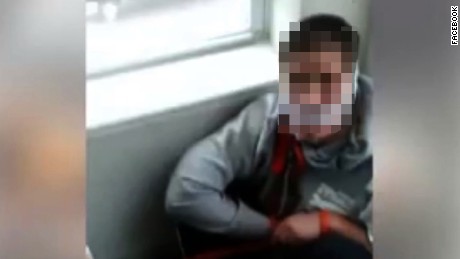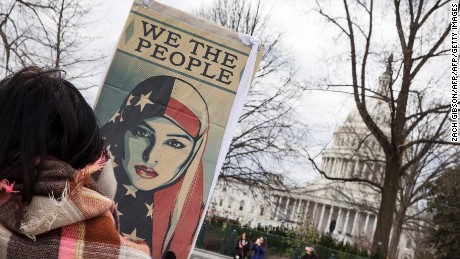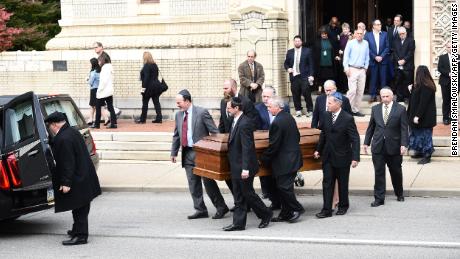On Friday, December 7, a fire destroyed a Jehovah's Witnesses house of worship. It was the fifth attack this year targeting the religious group in Washington state, federal officials said.The next day, a black man was assaulted at a bar in Lynnwood, Washington, by eight self-professed members of a neo-Nazi skinhead group, according to the Snohomish County Sheriff's Office. Members of the group allegedly yelled racist slurs during the incident, and an employee identified as an Asian man was injured as he tried to intervene.On Sunday, Pittsburgh officials said that anti-Semitic pamphlets were being spread throughout the city, including in the Squirrel Hill neighborhood, the site of a mass shooting that targeted Jews in October. The same day, Nazi-themed posters were found in various locations around the State University of New York's Purchase College. A student was arrested in connection with the posters and charged with a hate crime, the Westchester County District Attorney's Office said.On Monday, a 21-year-old man was arrested for allegedly plotting to kill worshipers in a Jewish synagogue in Toledo, officials said.The recent headlines reflect a broader trend, according to civil rights groups. There's been a rise in reports of such incidents over the past three years, they say — a trend that is also borne out by federal data.Each year, the FBI's Uniform Crime Reporting Program (UCR) releases the Hate Crime Statistics report based on incidents law enforcement agencies submit to the FBI. In 2017, the most recent year for which data is available, hate crime reports rose by about 17% from 2016. And that estimate may well be a low estimate. Reporting of hate crimes to the FBI is notoriously low, and an analysis of the 2017 UCR report by the Arab American Institute found that some apparent hate crimes that made headlines were not included in the report.Numerous factors account for the low rates of reporting, said Maya Berry, executive director of the Arab American Institute. Reporting is voluntary, and different law enforcement agencies follow different state laws or internal policies that dictate reporting of hate crimes. Of 16,149 agencies eligible to participate in the 2017 report, only 2,040 submitted incident reports, the data shows. In addition to the Charlottesville incident, the murder of an Indian engineer in a Kansas sports bar does not appear to be reflected in Kansas data from 2017, even though witnesses said that Srinivas Kuchibhotla's killer yelled "get out of my country" before he shot him. Adam Purinton pleaded guilty to state murder charges and faces additional federal hate crime charges in federal court.
Steady increases in hate crimes numbers since 2015
In 2015, reports of anti-Muslim hate crimes rose 67%, according to FBI numbers, from 154 incidents in 2014 to 257 in 2015. Civil rights groups say it was a turning point, with the following years showing a steady year-to-year increase. The next year, 2016, hate crimes reached a historic high. There was a surge in reports around the time of the 2016 presidential election, and reports continued to rise in 2017. Of 7,106 single-bias hate crimes reported in 2017, 59.6% of victims were targeted because of their race, ethnicity or ancestry; 20.6% were targeted because of their religion; and 15.8% were targeted because of their sexual orientation. Of the 5,060 victims targeted for their race, ethnicity or ancestry, 48.6% were attacked because of the offenders' anti-Black or African-American bias. Of the 1,749 anti-religious hate crimes, 58.1% were the product of anti-Jewish bias."Rising hate crimes continue to be a reality in America," said Jonathan Greenblatt, CEO of the Anti-Defamation League. "The rash of incidents we've seen recently are a reminder that we need to be vigilant against hate and anti-Semitism in all forms." While hate is not new to America, experts say the divisive political climate and the rise of hate speech, among other factors, are emboldening people to act on hateful impulses. The Unite the Right rally in Charlottesville, Virginia, in August 2017 was a byproduct of that emboldened hate, said Nadia Aziz of the Lawyers' Committee for Civil Rights Under Law. Mainstream America was seemingly caught off guard by scenes of torch-wielding white nationalists chanting racist and anti-Semitic slurs. Tensions boiled over as counterprotesters clashed with rally participants, and a Nazi sympathizer killed one person and injured dozens more with his car. But anti-hate groups say white supremacists and far-right extremist groups have been gathering momentum online and in underground movements for years.The driver in the Charlottesville incident, James Fields, was convicted in state court of first-degree murder in Heather Heyer's death, and on nine more charges stemming from the incident. But the Charlottesville case demonstrates how statistics can be unreliable — the FBI's 2017 data does not appear to include Fields' case, even though he also faces 30 federal hate crime charges stemming from the incident. Heyer was killed on August 12, 2017. But Charlottesville police did not report any incidents in the third quarter, the data shows. The agency only reported one incident in the fourth quarter of 2017.
While hate is not new to America, experts say the divisive political climate and the rise of hate speech, among other factors, are emboldening people to act on hateful impulses. The Unite the Right rally in Charlottesville, Virginia, in August 2017 was a byproduct of that emboldened hate, said Nadia Aziz of the Lawyers' Committee for Civil Rights Under Law. Mainstream America was seemingly caught off guard by scenes of torch-wielding white nationalists chanting racist and anti-Semitic slurs. Tensions boiled over as counterprotesters clashed with rally participants, and a Nazi sympathizer killed one person and injured dozens more with his car. But anti-hate groups say white supremacists and far-right extremist groups have been gathering momentum online and in underground movements for years.The driver in the Charlottesville incident, James Fields, was convicted in state court of first-degree murder in Heather Heyer's death, and on nine more charges stemming from the incident. But the Charlottesville case demonstrates how statistics can be unreliable — the FBI's 2017 data does not appear to include Fields' case, even though he also faces 30 federal hate crime charges stemming from the incident. Heyer was killed on August 12, 2017. But Charlottesville police did not report any incidents in the third quarter, the data shows. The agency only reported one incident in the fourth quarter of 2017.
FBI data paints an incomplete picture
Another reason why statistics don't tell the full story is because many crime victims don't report to law enforcement, said Logan Casey, policy researcher with Movement Advancement Project, which tracks laws and policies affecting the LGBTQ community."Given that only some jurisdictions keep statistics on hate crimes, and that as many as half of crime victims don't report their experiences to authorities, it's difficult to know the true incidence of these crimes," he said in an email. Although the LGBT community is not reflected in the series of apparent hate crimes of the past few days, "one of the trends we're seeing is a rise in hate crimes against LGBT people," he said. He pointed to data suggesting that 25 transgender people in have been murdered in the US this year, a record high for another year in a row.  "The vast majority of these victims are transgender women of color, illustrating the intersections of racist and anti-LGBT violence."Civil rights groups say it remains to be seen if the recent incidents are reported to the FBI or counted in the UCR's report next year.
"The vast majority of these victims are transgender women of color, illustrating the intersections of racist and anti-LGBT violence."Civil rights groups say it remains to be seen if the recent incidents are reported to the FBI or counted in the UCR's report next year.
What might be behind the trend
No single factor explains the apparent increase in hate incidents, experts say."Part of the problem is the increasing mainstream acceptance of hate speech and online hate," Greenblatt, of the Anti-Defamation League said. "Words have consequences. It's time for all leaders to step forward and clearly denounce hate. After the tragedy the Jewish community witnessed in Pittsburgh, it is not just something that we as Americans are asking of our leaders — but something we should come to expect."Aziz, Berry and Logan attributed the rise of hate crimes to divisive rhetoric from the Trump administration pertaining to marginalized communities, including immigrants and people of color, as well as policies that undermine the rights of those groups. The White House has not responded to CNN's request for a response to those allegations. "The President of the United States, both from his social media presence and his remarks during formal White House events, is regularly referring to fear as a motive for policy," Berry said. "We're seeing the presidential bully pulpit being used to divide and spread fear, and without question that has consequences in real peoples' lives."The upshot of the present state of affairs is that more groups are emerging to support victims of hate — and more people appear to be reporting incidents of bias, Aziz said. Aziz heads up the group's Stop Hate Project, which works to ensure individuals and organizations have resources to combat hate in their communities. Hate crimes require proof of the additional element of bias to the underlying crime, which makes it different from other crimes, especially in states with narrow categories of protected classes, she said.Acknowledging that many communities may not feel comfortable reporting to law enforcement, Aziz urged victims to go to police whenever possible — or to find someone to advocate on their behalf. She suggested calling the Lawyers' Committee hotline, or reporting an incident through a community group's website. If someone paints swastikas or racist slurs on a home or public property, Aziz advised documenting those examples before covering them up."As we talk hate crimes more and more, I hope people will be more comfortable about talking about them when they're targeted," she said.
"The President of the United States, both from his social media presence and his remarks during formal White House events, is regularly referring to fear as a motive for policy," Berry said. "We're seeing the presidential bully pulpit being used to divide and spread fear, and without question that has consequences in real peoples' lives."The upshot of the present state of affairs is that more groups are emerging to support victims of hate — and more people appear to be reporting incidents of bias, Aziz said. Aziz heads up the group's Stop Hate Project, which works to ensure individuals and organizations have resources to combat hate in their communities. Hate crimes require proof of the additional element of bias to the underlying crime, which makes it different from other crimes, especially in states with narrow categories of protected classes, she said.Acknowledging that many communities may not feel comfortable reporting to law enforcement, Aziz urged victims to go to police whenever possible — or to find someone to advocate on their behalf. She suggested calling the Lawyers' Committee hotline, or reporting an incident through a community group's website. If someone paints swastikas or racist slurs on a home or public property, Aziz advised documenting those examples before covering them up."As we talk hate crimes more and more, I hope people will be more comfortable about talking about them when they're targeted," she said.
Original Article
[contf] [contfnew] 
CNN
[contfnewc] [contfnewc]






